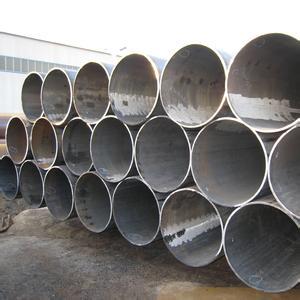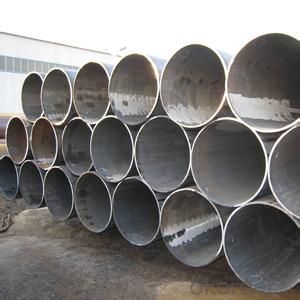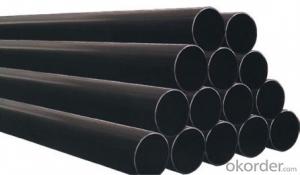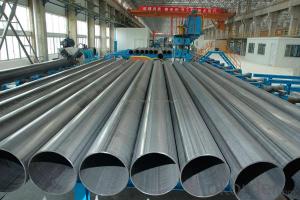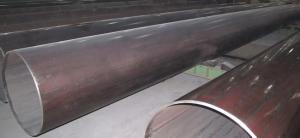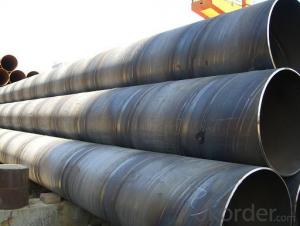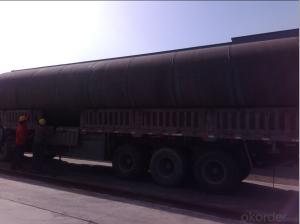32''-48'' CARBON STEEL LSAW WELDED PIPE API/ASTM/JIS/DIN
- Loading Port:
- Tianjin
- Payment Terms:
- TT OR LC
- Min Order Qty:
- 5 m.t
- Supply Capability:
- 300 m.t/month
OKorder Service Pledge
OKorder Financial Service
You Might Also Like
Packaging & Delivery
Packaging Detail: | standard export packing or as customer's requirement |
Delivery Detail: | within 10 - 30 days |
Specifications
Spiral Welded Steel Pipes and Tubes
1.Material:Q195-Q235
2.Length:1-12m
3.WT:1.0-14mm
4.O.D.:20-273mm
Product Description:
1.Material : Q235,Q345,L245,L290,L360,L415,L450,L485,GrB,X42,46,X52,X56,X60,X65,X70,X80,X100
2,Standard: SY/T5037-2000,GB/T9711-2011,API Spec 5L PSL1/PSL2,ASTM A252\A53,ISO3183,DIN17172,EN10217,JIS G3457,AWWA C200,ASTM A139,ASTM A671,ASTM A672
3.Wall thickness: 3.0mm-30mm
4.Outer diameter: φ168mm-3020mm
5,Length: 5m-12m or as your requirement
6,Corrosion protection standard: DIN30670,DIN30671, AWWAC210, AWWA C203, SY/T0413-2002,SY/T0414-2002
7,Application: Oil, gas, natural gas, water pipe, thermal electricity pipe, steel structure engineering, etc
Q195-q345 Material Steel Pipe's Materials
Elements | Chemical Compsition% | Mechanical Property | ||||||
C% | Mn% | S% | P% | Si% | Yield Point (Mpa) | Tensile Strength(Mpa) | Elongation | |
Q195 | 0.06-0.12 | 0.25-0.50 | <0.050< span=""> | <0.045< span=""> | <0.030< span=""> | >195 | 315-430 | 32-33 |
Q215 | 0.09-0.15 | 0.25-0.55 | <0.05< span=""> | <0.045< span=""> | <0.030< span=""> | >215 | 335-450 | 26-31 |
Q235 | 0.12-0.20 | 0.30-0.70 | <0.045< span=""> | <0.045< span=""> | <0.030< span=""> | >235 | 375-500 | 24-26 |
Q345 | <0.20< span=""> | 1.0-1.6 | <0.040< span=""> | <0.040< span=""> | <0.55< span=""> | >345 | 470-630 | 21-22 |
Packaging & Delivery
Packaging Detail: | Normal exporting packing,in container or bulk vessel or as per clients' request |
Delivery Detail: | 2 months after confimed contract |
Specifications
Large Diameter API 5L X70 PSL2 LSAW Steel Pipe
Grade: X42, X46, X50, X52, X60, B, C
OD: 1.5"-28"
WT: SCH10-SCH160
Brand:TPCO
Large Diameter API 5L X70 PSL2 LSAW Steel Pipe
Specifications:
u Standard: API 5L
u Grade: B, C, X42, X46, X50, X52, X56, X60, X65, X70, X80
u OD: 1.5"-28"
u WT: SCH10-SCH160
u Length: 5-12m
u Ends Finish: plain end, bevel end, grooved end
u Surface Treatment: bare, black varnished, oiled finish, red color, anti-corrosion, 3PE, FBE or epoxy coating
u Technique: hot rolled or cold drawn
u Application: api 5l steel pipe for conveying oil, water, gas
u Invoicing: based on theoretical weight or actual weight
u Payment Terms: L/C at sight, T/T or Western Union
u Trade Terms: FOB, CFR, CIF
u Certification: ABS manufacturing assessment, ABS design assessment, API 5CT, API 5L, DNV manufacturer certificate, ISO9001 quality management system certificate, ISO14001 environment management system certificate, GB/T28001 occupational health and safety management system certificate, A1 class manufacturing license of special equipment certificate, CCS, GL, LR, SGS, TüV, PDE
- Q: Can steel pipes be used for underground oil pipelines?
- Indeed, underground oil pipelines can utilize steel pipes. The construction of underground oil pipelines heavily relies on steel pipes owing to their robustness, longevity, and resistance to corrosion. They possess the capability to endure the immense pressure and weight exerted by the oil being transported, along with external forces like soil displacement or seismic events. Moreover, steel pipes can be fortified with coatings or linings such as epoxy or polyethylene, enhancing their resistance to corrosion and extending their lifespan. In conclusion, steel pipes emerge as a dependable and extensively employed option for underground oil pipelines.
- Q: How are steel pipes used in the manufacturing of shipbuilding and offshore structures?
- Steel pipes are widely used in the manufacturing of shipbuilding and offshore structures due to their high strength and durability. These pipes are used for various purposes such as constructing the hull of the ship, creating structural supports and framework, and facilitating the transportation of fluids and gases. Their corrosion-resistant properties and ability to withstand extreme conditions make steel pipes an ideal choice for these applications.
- Q: The difference between 12Cr1MoVG alloy steel tube and 15CrMo
- 12Cr1MoVG is a kind of material for alloy tubes. The main purpose is to make the steel structure in the boiler, the use temperature of 580 degrees, requiring high temperature resistance steel plate, durable strength, steel plate in the normalized and tempered state delivery. 12Cr1MoV alloy tube is based on high quality carbon structural steel. It is appropriate to add one or more alloy elements to improve the mechanical properties, toughness and hardenability of steel.
- Q: How are steel pipes used in the construction of geothermal power plants?
- Steel pipes are used in the construction of geothermal power plants primarily for two purposes: transporting geothermal fluids and ensuring the structural integrity of the plant. The pipes are used to extract hot water or steam from the geothermal reservoir deep underground and transport it to the surface. These pipes are designed to withstand high temperatures and pressures associated with geothermal fluids. Additionally, steel pipes are also used to distribute the extracted fluids to various parts of the power plant for electricity generation. Moreover, steel pipes are utilized in the construction of the plant's infrastructure, such as the framework, supports, and other structural components, ensuring the overall stability and durability of the geothermal power plant.
- Q: Are steel pipes suitable for use in hydropower plants?
- Yes, steel pipes are suitable for use in hydropower plants. Steel pipes are known for their durability, strength, and longevity, making them ideal for withstanding the high pressures and transporting fluids in hydropower plants. Additionally, steel pipes can effectively handle the flow of water and resist corrosion, making them a reliable choice for hydropower plant applications.
- Q: How do you protect steel pipes from fire?
- To protect steel pipes from fire, there are several measures that can be taken. One commonly used method is to apply fire-resistant coatings or paints to the surface of the pipes. These coatings or paints are designed to withstand high temperatures and provide a barrier that prevents the heat from reaching the steel. Another effective way to protect steel pipes from fire is to wrap them with fire-resistant insulation materials. These materials act as a buffer, reducing the heat transfer and slowing down the spread of fire. Insulation materials such as mineral wool or ceramic fiber blankets are commonly used for this purpose. In addition, it is important to ensure that the steel pipes are properly installed and supported. This includes maintaining proper clearance from other flammable materials and avoiding overcrowding or obstructions that could impede the flow of air around the pipes. Adequate spacing between pipes is also crucial to prevent the transfer of heat from one pipe to another. Furthermore, it is recommended to incorporate firestop systems when steel pipes pass through fire-rated walls or floors. Firestop systems consist of fire-resistant materials and seals that prevent the spread of fire and smoke through openings or penetrations in fire-rated barriers. Regular maintenance and inspections are essential to ensure the ongoing effectiveness of the fire protection measures. Any damage or deterioration of the coatings, insulation, or firestop systems should be promptly repaired or replaced to maintain the fire resistance of the steel pipes. Overall, a combination of fire-resistant coatings, insulation, proper installation, and maintenance practices are crucial in protecting steel pipes from fire hazards. These measures help to minimize the risk of fire-related damage and ensure the safety of both the pipes and the surrounding environment.
- Q: Can steel pipes be used for conveying hydraulic fluids?
- Yes, steel pipes can be used for conveying hydraulic fluids. Steel pipes have high tensile strength and excellent resistance to high pressure, making them suitable for hydraulic applications. They can withstand the high operating pressures and temperature fluctuations that hydraulic systems often experience. Additionally, steel pipes are durable and have a long lifespan, ensuring reliable and efficient fluid transmission in hydraulic systems. However, it is important to ensure that the steel pipes used are compatible with the specific hydraulic fluid being conveyed to prevent corrosion or degradation of the pipe material.
- Q: What are the common methods for cleaning the inner surface of steel pipes?
- There are several common methods for cleaning the inner surface of steel pipes. Some of the most widely used methods include: 1. Mechanical Cleaning: This method involves the use of mechanical tools such as wire brushes, scrapers, or abrasive pads to physically remove debris, rust, or scale from the inner surface of the steel pipe. This method is effective for removing loose or loosely adhered contaminants. 2. Chemical Cleaning: Chemical cleaning involves the use of acidic or alkaline solutions to dissolve or loosen stubborn deposits, rust, or scale on the inner surface of steel pipes. The solution is usually circulated through the pipe for a specific period of time, allowing the chemical to react and break down the contaminants. This method is often used when mechanical cleaning is not sufficient. 3. High-Pressure Water Jetting: In this method, high-pressure water is directed through a nozzle into the steel pipe, effectively removing debris, rust, or scale from the inner surface. The force of the water jet helps dislodge and flush out the contaminants. This method is particularly efficient for cleaning pipes with complex geometries or hard-to-reach areas. 4. Shot Blasting: Shot blasting involves the use of high-speed abrasive particles propelled against the inner surface of the steel pipe to remove rust, scale, or other contaminants. This method is commonly used for larger pipes or pipes with heavy deposits. It provides a thorough and uniform cleaning by removing the surface layer of the steel along with the contaminants. 5. Ultrasonic Cleaning: Ultrasonic cleaning uses high-frequency sound waves to create microscopic bubbles in a cleaning solution. These bubbles implode upon contact with the inner surface of the steel pipe, effectively loosening and removing contaminants. This method is particularly effective for cleaning small-diameter pipes or pipes with intricate details. It is important to note that the selection of the cleaning method depends on various factors such as the type and extent of contamination, pipe size and geometry, and the desired level of cleanliness. Additionally, proper safety measures should always be taken when performing any cleaning method to ensure the protection of workers and the integrity of the steel pipes.
- Q: How do you prevent steel pipes from freezing in cold climates?
- To prevent steel pipes from freezing in cold climates, it is important to insulate the pipes properly. This can be done by wrapping them with insulation sleeves or foam, which helps to retain heat and prevent rapid temperature changes. Additionally, ensuring that there is proper ventilation in the area where the pipes are located can help to maintain a higher temperature and prevent freezing.
- Q: How are steel pipes manufactured?
- Steel pipes are typically manufactured through a process called seamless or welded pipe manufacturing. In the seamless process, a solid steel billet is heated and pierced to create a hollow tube, which is then stretched and rolled to the desired size and shape. In the welded process, steel sheets are formed into a pipe shape and welded along the seam. These pipes are then further processed and finished before use in various industries.
Send your message to us
32''-48'' CARBON STEEL LSAW WELDED PIPE API/ASTM/JIS/DIN
- Loading Port:
- Tianjin
- Payment Terms:
- TT OR LC
- Min Order Qty:
- 5 m.t
- Supply Capability:
- 300 m.t/month
OKorder Service Pledge
OKorder Financial Service
Similar products
Hot products
Hot Searches
Related keywords
